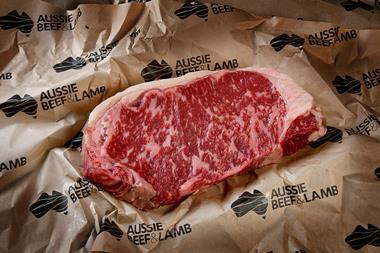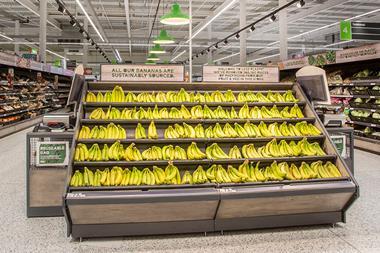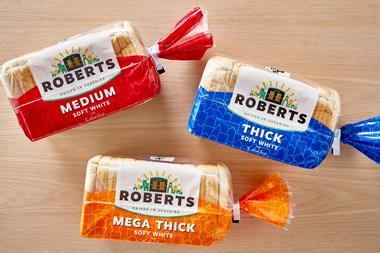It’s been another busy week on The Grocer.
The Joe Wicks mockumentary on Monday caused a huge brouhaha. His development of a ‘Killer’ protein bar gave rise to my favourite headline of the week, where we asked, quite simply: Is Joe Wicks ‘Killer’ protein bar really full of shit? in a piece that spoke to some major concerns over the mixed messages the celebrity fitness coach was giving out.
On Tuesday came some real news: Roberts Bakery was going into administration. In a category plagued with overcapacity, amid falling consumer demand, the only surprise is that there hasn’t been more casualties in this sector and, of course, it’s never really recovered from the fire which knocked out the main bread factory in 2023, struggling to win the back the volumes it lost as customers moved elsewhere. It’s a sad state of affairs and for the sake of the 400-plus workers, let’s hope the administrators can find a satisfactory outcome.
Alas that’s not the case for workers at SOS Wholesale. After it went into administration last month, sister company The Soft Drinks Company promised jobs would be transferred but we’ve found out the offer has been rescinded amidst “negative social media coverage”. Still, at least the IP assets of SOS Wholesale have been acquired.
Another important area of coverage this week has been Asda’s supplier conference this week and its plans for a bay-by-bay reset. In an update to our story, we’ve provided useful new data and datagraphics to capture the changes to the ranges to date and we’ll be sure to keep an eye on further range rationalisation and optimisation in the future.
Another story of note has been the Groceries Code Adjudicator’s latest retailer/supplier report. There are a number of interesting aspects to the report, with a notable improvement in the performance of Amazon as a retailer (though it’s still in last place). But the most interesting finding from the report pertained to the “nightmare” of inaccurate retailer forecasting and “erratic” retailer orders. Hot on its heels, we broke the news that Aldi had settled out of court with brassica supplier W Clappison. These closely related stories are the subject of my leader this week, in which I argue that buyers are on increasingly thin ice.
This week’s issue includes a cover story on the rise and rise of TikTok as a marketing vehicle. From supermarkets to corner shops, retailers are getting ever more creative in the ways they’re using TikTok to entertain, engage and ultimately embed themselves in their customers’ digital lives. But what does success actually look like on Gen Z’s favourite platform? We spoke to retail’s movers, shakers and content creators – along with TikTok and social media experts, of course – to find out how different types of business are approaching the platform, whether independents can really compete with the big players and where retailer content will go next. The headline speaks for itself: ‘Who is Doing TikTok best?’. But just as intriguing is the table showing who is off the pace.
Meanwhile, there’s a great story on who has the fastest (and slowest) self-checkout.
Intrigue also surrounds the Morrisons Aussie beef trials. As we report, Morrisons looks to be pressing on in deepening its relationship with Australian beef producers, despite the farmer outcry following the launch of the initial trial in June. I cannot help thinking Sir Ken Morrison will be spinning in his grave but you cannot entirely blame Morrisons for pursuing this new opportunity as UK beef prices have soared and demand among shoppers is falling. Farmers are also incensed that farmgate milk prices have slumped.
Talking of Morrisons, there’s another exclusive from The Grocer this week on Morrisons’ move into rapid delivery with new service Now.
And finally there’s a couple of NPD developments I wanted to draw your attention to.
The first is the new Gingerbread Doritos. It’s a development that has fired the imagination of shoppers, as fmcg editor Niamh Leonard-Bedwell reported in this opinion piece.
And next time you p…p…pick up a Penguin, check out the back of the p…p…packet. There’s a new ingredient at the top of the ingredients list. The ‘chocolate’ biscuits now feature a ‘chocolate flavour coating’ made of sugar, palm and shea oils, which reduces the need for actual (and increasingly expensive) cocoa. It’s clever stuff. And it’s not an isolated case. As we explore in our cakes & biscuits category report, McVitie’s has also reformulated its Club biscuits and its White Digestives, while Nestlé’s Kit Kat White, Mr Kipling Chocolate Orange Cake Slices and Finsbury’s Nadiya Hussain Bazillionaire Brookies have undergone a similar transformation.
Have shoppers spotted (or tasted) the difference? P… p… possibly not. But it does make you wonder how the market might develop. Grocery is full of cases where reformulation has opened the door to competition. On the one hand, it’s an opportunity for rivals to showcase their ‘real chocolate’ credentials. On the other, it feels inevitable that, with commodity giants, major suppliers and startups investing in faux-chocolate production using sunflower and grape seeds, fava beans and carob, faux-chocolate usage will p… p… pick up.




















No comments yet